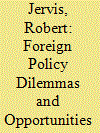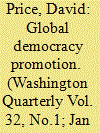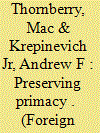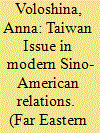| Srl | Item |
| 1 |
ID:
174251


|
|
|
|
|
| Summary/Abstract |
THERE IS A CONSIDERABLE CHANCE that the Democrats will win the presidential election in November and whether one approves of this outcome or not, it is worth thinking about what a new administration’s foreign policy would look like. Although in politics nothing is certain, as the sole remaining Democratic candidate Joe Biden is very likely to be the nominee and I will use the male pronoun when referring to the new president. He probably will bring with him many officials who had previously served him and President Barack Obama, and while the knowledge and experience of this cohort will be a major asset, the counterpart hazard is the impulse to urge policies that mimic or vindicate Obama’s. It is not necessary to deny the considerable achievements of that administration to note that the world now presents the country with new dangers and new opportunities.
|
|
|
|
|
|
|
|
|
|
|
|
|
|
|
|
| 2 |
ID:
086349


|
|
|
|
|
| Publication |
2009.
|
| Summary/Abstract |
A professed commitment to worldwide democracy promotion has been a hallmark of U.S. foreign policy for many years and was given a distinctive emphasis by the outgoing administration. President George W. Bush calls it "the urgent requirement of our nation's security, and the calling of our time."1 Promoting democracy, however, is not merely a matter of advocacy via an international megaphone. Policies of the Bush administration have led many to question the methods used to promote democracy or even the goal itself. Despite such criticism, much of it warranted, democracy promotion remains a central plank of U.S. foreign policy, an expression of U.S. values, and a tool that can be used to pursue the strategic interests of the United States. It is critically important, therefore, to learn from the mistakes of the past seven years and to rethink and refine the theory and practice of democracy promotion.
|
|
|
|
|
|
|
|
|
|
|
|
|
|
|
|
| 3 |
ID:
150322


|
|
|
|
|
| Summary/Abstract |
It has been two decades since the nuclear Comprehensive Test Ban Treaty (CTBT) was opened for signature at the United Nations. So far, 183 states have signed and 166 have ratified the treaty, which U.S. President Bill Clinton called “the longest-sought, hardest-fought prize in the history of arms control.”
|
|
|
|
|
|
|
|
|
|
|
|
|
|
|
|
| 4 |
ID:
147102


|
|
|
|
|
| Summary/Abstract |
The next U.S. president will inherit [1] a security environment in which the United States con¬fronts mounting threats with increasingly constrained resources, diminished stature, and growing uncertainty both at home and abroad over its willingness to protect its friends and its interests. Revisionist powers in Europe [2], the western Pacific [3], and the Persian Gulf [4]—three regions long considered by both Democratic and Republican administrations to be vital to U.S. national security—are seeking to overturn the rules-based international order. In Europe, Russian President Vladimir Putin has seized Crimea [5], waged proxy warfare in eastern Ukraine [6], and threatened NATO allies on Russia’s periphery. Further demonstrating its newfound assertiveness, Russia has dispatched forces to Syria and strength-ened its nuclear arsenal. After a failed attempt to “reset” relations with Moscow, U.S. President Barack Obama has issued stern warnings andimposed economic sanctions [7], but these have done little to deter Putin.
|
|
|
|
|
|
|
|
|
|
|
|
|
|
|
|
| 5 |
ID:
156592


|
|
|
|
|
| Summary/Abstract |
The author examines the place and role of the Taiwan issue at the present stage of Sino-American relations. The author asserts that despite a certain softening of discord during the Ma Yingjeou administration and decreasing possibility of the Taiwan problem becoming a cause of conflict between China and the United States, historical differences between Beijing and Washington on Taiwan have not been resolved. The victory of the Democratic Progressive Party (DPP) candidate Tsai Ingwen in the last presidential election may become a new challenge for relations between the PRC and the U.S.A.
|
|
|
|
|
|
|
|
|
|
|
|
|
|
|
|
| 6 |
ID:
150195


|
|
|